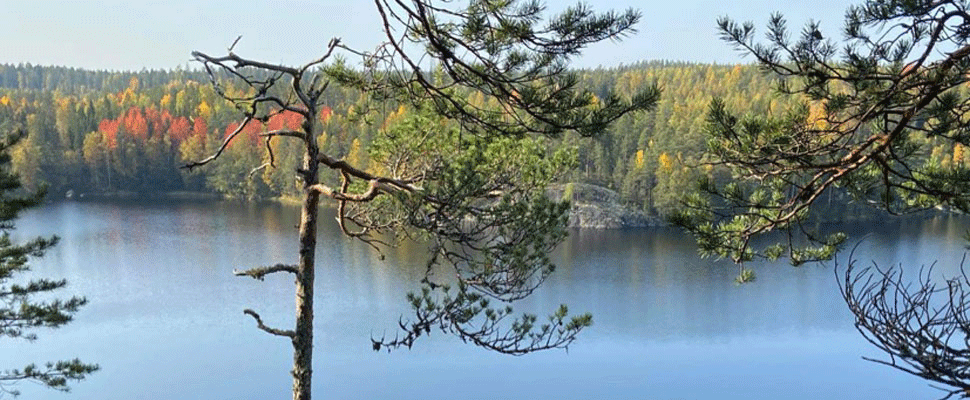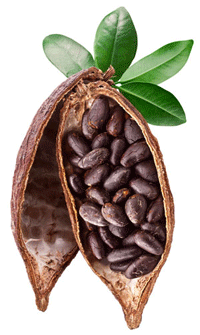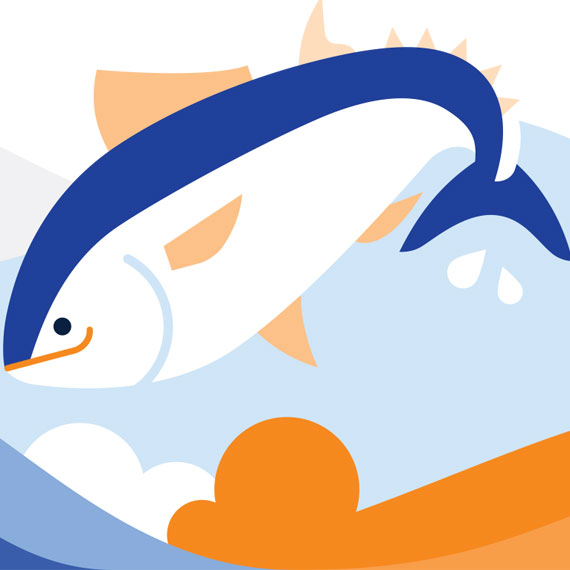
We operate in a sustainable way promoting biodiversity

Human existence is dependent on nature. Nature and its rich biodiversity provide us with natural resources, such as food, clean water, energy and raw materials. People’s actions are causing the currently ongoing sixth mass extinction of species. We must do things in such a way that makes our utilisation of the land and seas sustainable.
At K Group, we have identified our ties, impacts and opportunities related to biodiversity. As a trading sector company, we understand our role in securing and promoting biodiversity.
We will strengthen our biodiversity work and prepare division-specific goals to promote biodiversity.
The key principles according to which we progress in our biodiversity work are:
-
We operate in a sustainable way promoting biodiversity.
-
We promote sustainable use of natural resources in our own operations and value chains.
-
We build our selection in such a way that strives to promote the preservation of biodiversity throughout the life cycle of the products we sell.
-
We observe our sustainability policies guiding our sourcing to prevent causing any risks to biodiversity in our supply chains.
-
We enable our customers to lead sustainable and healthy lifestyles.

Our greatest impacts on biodiversity occur throughout the life cycle of the products on sale.
Raw materials critical to biodiversity in our supply chain include fish and shellfish, timber, palm oil, soy, cocoa and cotton. The sustainable sourcing of these materials is guided by our sustainability policies.
We are committed to supporting the UN Sustainable Development Goals (SDGs) in our operations. From the perspective of biodiversity, we promote the following SDGs in particular:

The commitment on biodiversity was approved by Kesko’s Group Management Board on 25 January in 2021.
We have carried out an ecosystem services assessment to identify what services provided by nature we are using and where we can make an impact on with our actions.
Provisioning services are material benefits provided by ecosystems, such as food, raw materials of products, energy and water.
Regulating services are processes of the ecosystems that life on earth is based on. The key processes were climate and air quality, pollination, pest and disease control, waste management, soil formation, photosynthesis and circulation of nutrients and water.
Cultural services are non-material benefits offered by nature, such as beauty of nature and unpolluted nature and diverse, thriving rural landscape.
Our greatest impacts on biodiversity occur throughout the life cycle of the products on sale.
Raw materials critical to biodiversity in our supply chain include fish and shellfish, timber, palm oil, soy, cocoa and cotton. The sustainable sourcing of these materials is guided by our sustainability policies
We have classified the products and investments in each division that are sustainable from a climate and/or biodiversity perspective. We define sustainable products as those which have a significantly smaller impact on the climate or biodiversity than comparable products or which are important for adapting to climate change or preventing the loss of biodiversity. We report investments which decrease emissions from our own operations or emissions caused by our customers’ actions.
To improve transparency of our supply chains, we have launched the Tracing our Products website, where we provide information on the origin of products and their journey to the shelves of K-stores.
The website provides information on, among others, the origin of all Pirkka and K-Menu tuna, a mywear t-shirt and Pirkka Fairtrade roses and their journey to the shelves of K-stores. For products of Finnish origin, we first provide information on the journey of PROF Timber products from the forest to sawmills and then on to K-Rauta stores. We aim to add information to the website on products that our customers and stakeholders are particularly interested in.
The products on the Tracing our Products website are K Group’s own brand products. We will select products that face challenges regarding the sustainable production of raw materials and whose purchasing is steered by K Group’s sustainability policies.

To reduce biodiversity loss and to preserve biodiversity, largely the same measures are needed as those used to mitigate climate change: people’s lifestyles must be made more sustainable.
All K Group divisions have the opportunity to offer customers solutions for reducing their climate impacts, since the biggest sources of greenhouse gas emissions in private consumption are housing, food, and transportation.
Circular economy and waste management
The transition to a circular economy requires increasingly efficient circulation of materials. We provide our customers with diverse recycling services for packaging, waste and discarded items. We actively develop solutions together with our partners to utilise, for example, production side streams or food waste.
Waste for recovery
Our objective is to minimise and recover all waste from our operations. In 2024, the recycling rate of the waste generated in Finland was more than 81% and 46.2% in the other operating countries.
Food waste
We are committed to halve our food waste by 2030 from the 2019 level. Our primary means to prevent waste are selection and replenishement management. Also, our transport and store logistics are optimised so that as little food waste as possible is generated.
We minimise the climate and nature impacts of our store site projects
We calculate the lifecycle carbon footprint of all new-build store projects, and strive to direct planning to minimise carbon emissions. Top class energy efficiency and natural refrigerants play a central role in minimising the lifecycle emissions of a store property.
We map out the most significant tangible measures related to maintaining and increasing biodiversity in construction projects and store maintenance. Our objective is, wherever possible, to increase biodiversity also in store maintenance work.
Offsetting the environmental impacts of constructing Onnela logistics centre
From the outset, environmental and nature values have been considered in the construction of the Onnela logistics centre, which was completed in autumn 2025. An environmental survey was conducted on the project site before construction began.
In November 2025, Kesko and the City of Hyvinkää agreed to compensate for the ecosystem degradation caused by the construction of the Onnela logistics centre and to generate new nature values in the Härkävehmaansuo area. The agreement is partly based on the principles of voluntary ecological compensation laid down in the Nature Conservation Act. Under the agreement, Kesko will finance measures to enhance the area’s nature values and pay a fixed compensation for its conservation use. The amount of the fixed compensation is estimated at €327,000.
The Onnela logistics centre, the largest single construction project in Kesko’s history, is located in northern Hyvinkää. In Onnela’s design and construction, particular attention was paid to reducing energy consumption and carbon footprint, thus reducing both costs and emissions over the property’s long life cycle.
In the following we describe the risks and opportunities related to biodiversity that we have identified and have an impact on the operations of K Group and its value chains.
Risks
The risks threatening biodiversity that impact K Group’s operations and value chain include:
- Loss of species
- Reduction of pollinators; 70% of crops are dependent on pollinators
- Loss of forests
- Shortage of water; soil drying and erosion
- Pollution and eutrophication
- Reproduction of pests and diseases, such as zoonoses
Increasing regulation to protect biodiversity and loss of species, such as those listed below, requires making changes in business and causes additional costs:
- EU Deforestation Regulation
- Fishing quotas and prohibitions
Opportunities
We enable our customers to lead sustainable and healthy lifestyles.
We already promote sustainable use of natural resources in our own operations.
- Mitigating climate change: Carbon Neutral K
- Promoting circular economy solutions and minimising food waste
- Restoring nature: K Fishpaths
We build our selection in such a way that strives to promote the preservation of biodiversity throughout the life cycle of the products we sell.
- Sustainable products
- Sustainability policies
BIODIFUL project
Kesko takes part in the Biodiversity Respectful Leadership (BIODIFUL) project, which examines biodiversity from various perspectives, including consumption, business, and the society.
The interdisciplinary project is led by the University of Turku. Other participants include the Turku School of Economics, Jyväskylä University School of Business and Economics, Lappeenranta–Lahti University of Technology LUT, Natural Resources Institute Finland (Luke), and the Functional Foods Forum.
The project objective is to reshape ideas about business, institutional practices, and consumer behaviour towards leadership that respects biodiversity. Special focus is on the food system and recreational use of nature, which are central to the wellbeing of people and other living things.
Read more about the project
FIBS and Sitra pilot
Kesko is participating in a pilot organised by FIBS and Sitra which enables selected corporations to test the Science Based Targets Network (SBTN) instructions for setting science-based targets for nature.
The international Science Based Targets Network is currently developing instructions for corporations and cities on how to set science-based targets for nature. The instructions are set to be published before the end of 2022, and the objective is to accelerate corporate action aimed at stopping the loss of biodiversity.
FIBS implements the pilot in Finland, funded by Sitra. A total of 10 companies were selected for the pilot, which began in April 2022.
Read more about the pilot
K Fishpaths
Over the period 2017–2021, we carried out an extensive K Fishpaths collaboration with the environmental organisation WWF Finland to save endangered migratory fish populations. All migratory fish in Finland are endangered because our streams and rivers are full of barriers that block migration, such as culverts or old mill dams. During the collaboration we removed 27 barriers to migratory fish spawning grounds and created 300 new gravel beds in a spirit of cooperation with local operators, land and
waterway owners, local K-retailers and volunteers. With these efforts, we freed over 100 km of spawning grounds and habitats for endangered fish. During the collaboration, we organised 35 K Fishpaths events, in which a total of more than 1,000 volunteers participated along with more than 70 K-stores and K-retailers.